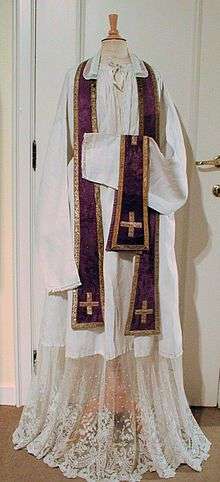maniple
English
Alternative forms
Etymology
From the Middle English maniple, manyple, manaple, borrowed from Old French maniple, manipule (manipule in Modern French), from the Latin manipulus (“handful”, “troop of soldiers”), from manus (“hand”) + the weakened root of pleō (“I fill”).
Pronunciation
- (General American) IPA(key): /ˈmænɪpəl/
- Hyphenation: man‧i‧ple
Audio (UK) (file) - Rhymes: -ænɪpəl
Noun
maniple (plural maniples)
- (rare) A handful.
- (historical) A division of the Roman army numbering 60 or 120 men exclusive of officers, any small body of soldiers; a company.
- Originally, a napkin; later, an ornamental band or scarf worn upon the left arm as a part of the vestments of a priest in the Roman Catholic Church, and sometimes worn in the English Church service.
Derived terms
- Maniple of the Curates
Related terms
Translations
division of the Roman army
References
- “maniple” in Douglas Harper, Online Etymology Dictionary, 2001–2019.
Anagrams
This article is issued from
Wiktionary.
The text is licensed under Creative
Commons - Attribution - Sharealike.
Additional terms may apply for the media files.
